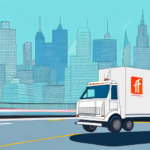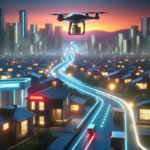Unlocking the Benefits of Last Mile Delivery Services
Last mile delivery refers to the final stage of the supply chain, where the product is transported from a distribution center or fulfillment center to the end user's doorstep. It is often considered the most critical and challenging part of the supply chain. With technological advancements and innovative solutions, companies have optimized their last mile delivery operations, reaping significant benefits. This article explores the concept of last mile delivery, its importance in logistics, and the advantages it offers to both companies and customers.
Understanding the Importance of Last Mile Delivery in Logistics
Last mile delivery is the final link in the supply chain that connects the product to the end customer. It is the stage where the product is delivered to the customer's doorstep, and the customer finally receives the product they ordered. Although it may seem straightforward, it is a critical part of the supply chain, where any delays or errors can result in dissatisfied customers and financial losses. According to a recent industry report, last mile delivery can account for up to 53% of total shipping costs.
Challenges and Expectations
One of the main challenges of last mile delivery is the increasing demand for faster delivery times. Customers now expect same-day or next-day delivery, putting pressure on logistics companies to optimize their delivery routes and processes. Additionally, effective communication between the logistics company and the customer is essential. Customers want real-time tracking information and timely updates about their delivery status.
Technological Innovations
To address these challenges, companies are adopting new technologies such as drones and autonomous vehicles to improve delivery times and reduce costs. Furthermore, real-time tracking and automated customer notifications enhance transparency and trust, leading to better customer experiences.
Enhancing Customer Satisfaction and Loyalty Through Last Mile Delivery
Last mile delivery significantly impacts customer satisfaction and loyalty. Companies that can provide fast and reliable delivery have a competitive advantage in the market. Offering same-day or next-day delivery options can increase customer satisfaction and encourage repeat business.
Flexible Delivery Options
Providing flexible delivery options, such as evening or weekend deliveries, or allowing customers to choose specific delivery times and locations, caters to individual preferences. This personalization enhances the customer experience, making customers feel valued and understood.
Real-Time Tracking and Communication
Implementing real-time tracking systems and providing delivery notifications via SMS or email keeps customers informed about their orders. This transparency helps build trust and reduces the anxiety associated with waiting for deliveries.
Technology's Role in Optimizing Last Mile Delivery Operations
Technology is pivotal in optimizing last mile delivery operations. Advanced analytics, automated routing, and delivery route optimization help minimize delivery times and reduce transportation costs. Additionally, mobile devices and scanning technology improve delivery accuracy and reduce errors.
Advanced Analytics and Route Optimization
Using data analytics to optimize delivery routes ensures that deliveries are completed efficiently, saving time and fuel. Route optimization software can analyze traffic patterns, weather conditions, and other variables to determine the most efficient paths.
Emerging Technologies
The adoption of drones, autonomous vehicles, and robotics is revolutionizing the last mile delivery industry. These technologies promise to further enhance efficiency and cost-effectiveness, paving the way for faster and more reliable deliveries.
The Impact of Last Mile Delivery on Supply Chain Efficiency
Efficient last mile delivery can significantly enhance the overall efficiency of the supply chain. It reduces inventory carrying costs, increases delivery speeds, and shortens fulfillment times. Moreover, optimizing the last mile process can decrease the number of vehicles required, lower fuel costs, and minimize the carbon footprint.
Cost Reduction and Operational Efficiency
Investing in technologies like route optimization software and real-time tracking systems can lead to substantial cost savings and improved operational efficiency. These advancements help businesses streamline their delivery processes, ensuring timely and accurate deliveries.
Sustainable Practices
With growing environmental concerns, many companies are adopting sustainable delivery methods such as electric vehicles, bicycles, and walking couriers. These eco-friendly options not only reduce carbon emissions but also enhance the company's reputation as a responsible and sustainable business.
Future Trends and Innovations in Last Mile Delivery
The last mile delivery industry is continuously evolving, with several trends and innovations shaping its future. Key trends to watch include the rise of sustainable delivery options, the increased use of autonomous technologies, and the growing demand for on-demand and same-day delivery services.
Autonomous Technologies
Autonomous vehicles and drones are set to play a significant role in the future of last mile delivery. These technologies can further reduce delivery times and operational costs, making deliveries more efficient and reliable.
Sustainable Delivery Options
As environmental awareness increases, the demand for sustainable delivery solutions will continue to grow. Companies are exploring various eco-friendly methods to meet this demand, contributing to a greener and more sustainable logistics industry.
Overcoming Challenges in Last Mile Delivery
Despite its benefits, last mile delivery poses several challenges for companies. Managing unpredictable demand, reducing transportation costs, and optimizing delivery routes are common obstacles. To overcome these challenges, companies must invest in technology, develop efficient supply chain systems, and collaborate with logistics partners.
Managing Demand and Costs
Utilizing data analytics helps companies anticipate demand fluctuations and adjust their operations accordingly. This proactive approach ensures that resources are efficiently allocated, reducing costs and improving service levels.
Enhancing Customer Communication
Providing real-time updates and maintaining open lines of communication with customers are essential for overcoming satisfaction-related challenges. Implementing robust customer service systems can help address issues promptly and maintain high levels of customer satisfaction.
Best Practices and Case Studies
Adopting best practices can significantly enhance last mile delivery efficiency. Key best practices include investing in automation, optimizing delivery routes, collaborating with logistics partners, and offering flexible delivery options. Learning from successful implementations by leading companies can provide valuable insights.
Successful Implementations
For example, Amazon has extensively invested in its delivery network, enabling it to offer same-day and next-day delivery options. Similarly, FedEx has implemented route optimization and automation technologies, resulting in significant cost savings and increased operational efficiency. These case studies highlight effective strategies that other businesses can adopt to improve their last mile delivery services.
The Future of Last Mile Delivery and E-commerce Growth
The future of last mile delivery is poised to have a profound impact on the e-commerce industry. Continued advancements in technology, such as drones, autonomous vehicles, and robotics, will enhance delivery efficiency and cost-effectiveness. The growing demand for on-demand and same-day delivery services will further fuel the industry's growth, as customers increasingly seek fast and reliable delivery options.
In conclusion, last mile delivery services play a critical role in the supply chain, offering significant benefits to businesses and customers alike. By leveraging the latest technologies and adopting best practices, companies can continuously improve their last mile delivery operations, ensuring competitiveness in an ever-evolving market.




















